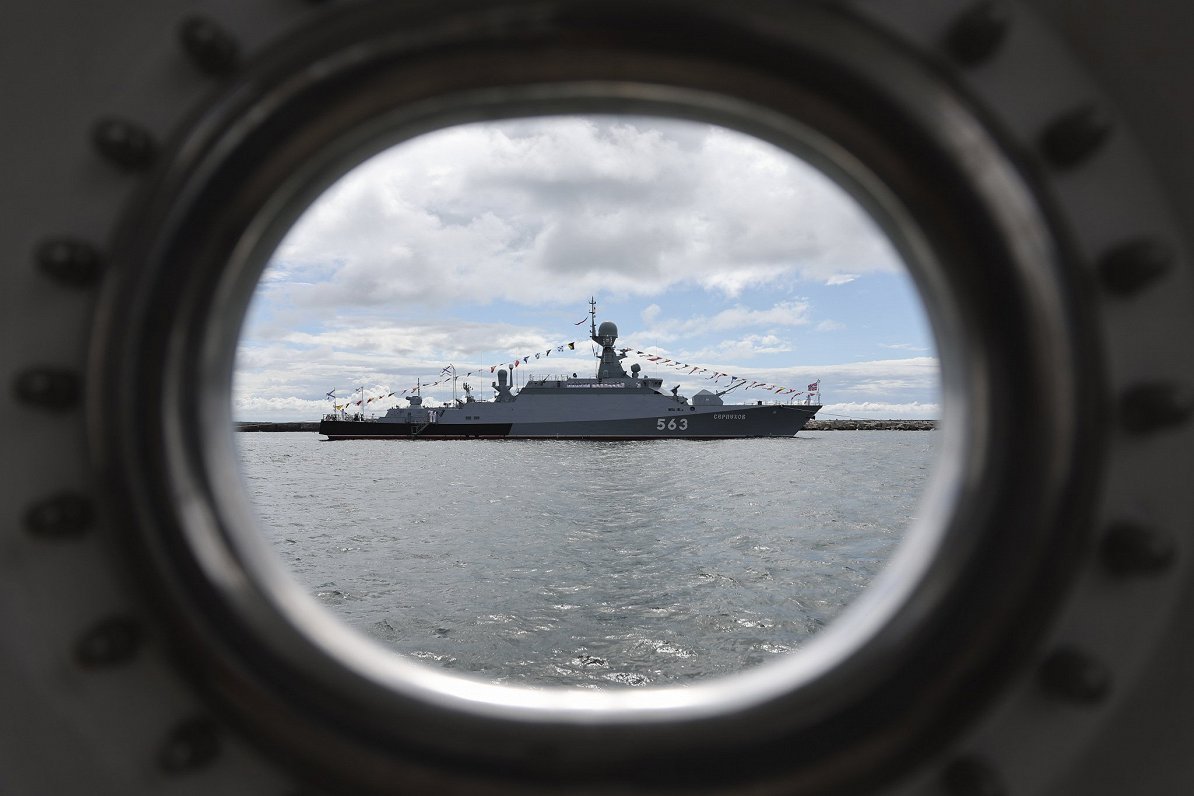Before the Russian invasion of Ukraine, when European Union (EU) sanctions prevented the delivery of technology to the Russian Navy, Russian warships were supplied with parts for German-designed ship diesel engines, via a Rīga-based company over several years, it is claimed.
Since Russia illegally occupied the Crimean peninsula in 2014 it has not been allowed to supply technology to the Russian Navy due to EU sanctions. However, diesel engines based on German technology found a place in "Grayvoron" warships as recently as last year. They were used in the spring of this year for shelling Odesa. It turns out that the engines of these ships were manufactured by the Chinese company "Henan" based on a previously purchased license. Information in the "Importgenius" database on cargo transportation in Russia made it possible to track the supply routes of the necessary additional technologies.
Correctiv journalist Frederik Richter said: "While we were investigating the origins of the Chinese diesel engines, we discovered that a company in St. Petersburg had bought engines for use in Russian military ships and imported various other engine equipment from Germany. And then we also found that these technologies were not received directly from Germany, but through a company in Rīga."
The company "Marine Propulsion Systems" in St. Petersburg has been ordering German-made marine diesel engines and their parts for years. Until 2011, it had direct cooperation with the manufacturer Deutz in Cologne. Later, part of the St. Petersburg company's operations were transferred to Rīga, under a company called "Marine Systems". The Deutz company in Cologne and other companies have continued to deliver ship engines and related equipment to Latvia in accordance with the orders.
The main occupation of "Marine Systems" was the production of metal products, the supply of engines was only a small part of the business.
Die Welt and Correctiv write that after 2014, when Germany was no longer allowed to deliver so-called dual-use – civil and military – goods to Russia, deliveries continued, thinking that they would be used for civilian watercraft in the EU. It seems that the manufacturers did not know about the equipment crossing the Russian border. The Rīga-based company "Marine Systems", which was renamed "MS Productions" this year, opposes such a statement.
"It's not that no one knew anything. But they saw the company in the contract, which is the destination of the shipments," admitted the financial director of the company, Karina Giješa. She said that ship technology manufacturers in Germany always knew that they would deliver engines to St. Petersburg. On the other hand, the company there "Marine Propulsion Systems" has not been subject to sanctions. At the same time, Giješa admitted that it was not in the company's power to make sure that the equipment sent to Russia was used in accordance with the concluded agreements and not, for example, in the military infrastructure, which would be a violation of sanctions.
"Even now we don't know for sure whether the engine is installed in the ship specified in the purchase documents. How can we make sure of that? We can't. Usually, when we take it out, the Strategic Department of the Ministry of Foreign Affairs asks to submit documents for each engine. No one had any questions, there was no problem," Giješa said.
In order to find out what activities are going on in MS Productions at the moment, the journalists of Die Welt and Correctiv asked Latvian Radio for help. At the company's registered legal address, Latvian Radio spoke to a representative of the premises manager who said Marine Systems had worked there, but did not comment when the company left. Also, no activities are currently taking place at its production facility in Ādaži. This was confirmed by an employee who said: "From May or June they stopped production with metals. But what's the matter, do they owe anything?"
It turns out that the company's operations came to a sudden halt following the Russian invasion of Ukraine on February 24, when any kind of cooperation with Russia was stopped. The effect was immediate. The factory has been quiet since May, around 90% of workers have been laid off, and losses exceed 1 million euros.
In 2020, the turnover of Marine Systems was over 22 million euros, while profits exceeded one and a half million euros, according to "Lursoft" data. The head of the metalworking company is Russian citizen Igor Smolin. Latvian Radio found out that he is currently not in Latvia, apparently looking for opportunities to develop his business elsewhere in Europe.
After the war that started in Ukraine, the boss's Russian citizenship is an obstacle to continuing work, according to the company's financial director Giješa: "If it weren't for the problem that started in February, no one would have these questions."
It should be noted that Marine Systems has not been found guilty of any criminal activity.
Since Russia's invasion of Ukraine, there has been a surge in reports of possible sanctions evasion efforts in the financial field – from 13 two years ago to almost 100 this year, the head of the Strategic Analysis Department of the Financial Intelligence Service, Paulis Iljenkovs, told Latvian Radio. The service did not comment on specific examples, but indicated several cases where business ties with Russia or Belarus in the sector affected by sanctions have continued.
"Therefore, if it is suspected that a company continues to deliver prohibited goods to Russia, this could be called a violation of sanctions, for which liability is provided in the Criminal Law. If a company receives funds in a bank account for such a transaction, we will consider them as criminally obtained funds, which we will be able to freeze," explained Iljenkovs.
The role of investigative journalism will become increasingly important for companies' efforts to circumvent sanctions towards Russia, emphasized Correctiv journalist Richter: "Various engineering technology, health care and other companies will think about how to continue the business ties they have started, using detours through China, Central Asia and other places, including the Baltic States."































